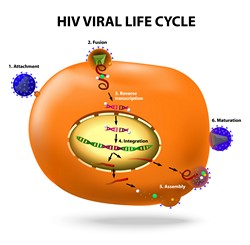Insight into the HIV life cycle
An essential step in HIV life cycle entails the conversion of its single-strand RNA into double-strand complementary DNA that can integrate into the host genome. This process is catalysed by the viral polymerase enzyme reverse transcriptase (RT), and has been exploited as a therapeutic means of targeting HIV. However, the precise mechanism and kinetics of RT function remain elusive. Scientists of the EU-funded HIV RT (Mechanics of HIV reverse transcriptase) project wished to investigate the RT mechanism of activity. Towards this goal they developed assays for measuring and analysing single molecules of RT. Results demonstrated that the orientation of RT when associated with nucleic acids was highly dynamic and involved both flipping and sliding transitions. Binding of RT to nucleic acids became substantially weaker at physiological salt conditions, and strengthened by the presence of crowding agents. DNA bound proteins also underwent restructuring, allowing the macromolecules to reorient themselves in different configurations and engage in different catalytic activities. These transitions were associated with processing of the poly-purine tract, a sequence that serves as a primer in reverse transcription. Furthermore, researchers investigated the process of strand displacement synthesis, where RT unwinds a nucleic acid double helix to copy the genetic code. To elucidate the mechanism of unwinding, they measured RT elongation against a series of duplex structures. The rate of DNA replication critically depended on the thermodynamic stability and the backbone content of the duplex. Intriguingly, project researchers discovered that RT connects with the non-template nucleic acid strand. Taken together, this information suggests that RT employs an active mechanism to unwind genetic material, somewhat like DNA helicases. From a therapeutic perspective, the generated knowledge is expected to aid the process of drug discovery by testing the ability of new drugs to influence the processes of flipping and displacement synthesis.







